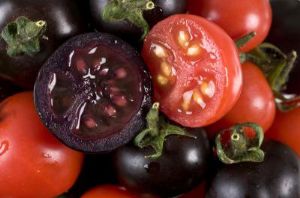
British researchers said on the 26th that they have grown into a kind of genetically modified purple tomato, which may have the effect of fighting cancer and some cardiovascular diseases.
Purple tomato
The research team led by Kathy Martin, professor at John Innes Center, conducted the study.
Previous studies have confirmed that anthocyanins can significantly slow down the growth of colon cancer cells, and at the same time have the effect of resisting cardiovascular diseases.
Using the high anthocyanin content of snapdragons, the researchers transferred the two genes of this plant to ordinary tomatoes and developed a purple-colored tomato.
This tomato has high anthocyanin content in its skin and fruit.
In addition, dark berries such as blackberries, cranberries, and American plum are also higher in anthocyanins than other fruits.
Tomato itself contains antioxidants such as lycopene and brassoids. The research team believes that the consumption of this transgenic purple tomato, which is rich in anti-cancer anthocyanins, will greatly benefit the reduction of cancer and other diseases.
The results were published in the latest issue of Nature-Biotechnology.
Rat test
To test the anti-cancer efficacy of this purple tomato, researchers have conducted experiments on mice.
The researchers used transgenic technology to make two groups of mice develop cancer. They fed one group of mice with purple tomatoes and the other group with normal red tomatoes.
The results showed that mice that consumed purple tomatoes lived an average of 182 days and mice that consumed ordinary tomatoes had an average lifespan of 142 days.
Martin said that this experiment proves that by changing the diet and the ingredients in food, it can slow the development of sexually transmitted diseases and promote physical health.
Lala Bennett of the British Cancer Research Center welcomed the study. According to her statement, rational use of genetic technology can make food more beneficial to health.
At this stage, the research team is dedicated to studying how to increase the content of beneficial substances in common fruits and vegetables.
Martin believes that if people eat fruits and vegetables on a daily basis, if more of these fruits and vegetables have higher bioactive substances, people can get more nutrition.
Look carefully
Researchers warn that it is too early for purple tomatoes to be used in human trials. They next plan to study how anthocyanins affect cancer and promote health.
Some medical experts believe that the results of Martin et al.'s findings confirm previous arguments that people can promote physical health through diet changes.
Bennett believes that most people agree that eating more fruits and vegetables and eating meat in appropriate amounts will help reduce the risk of cancer.
But he believes that eating anthocyanin-rich foods can reduce the risk of cancer is not reliable.
According to Anna Danny, nutritionist at the British Nutrition Foundation, at this stage, humans do not have "magic bullets" in the fight against cancer and heart disease.
He suggested not to hold high expectations for the results of this experiment. "We should not completely replace balanced diets with fruits and vegetables that are rich in healthy compounds." (He Shan)